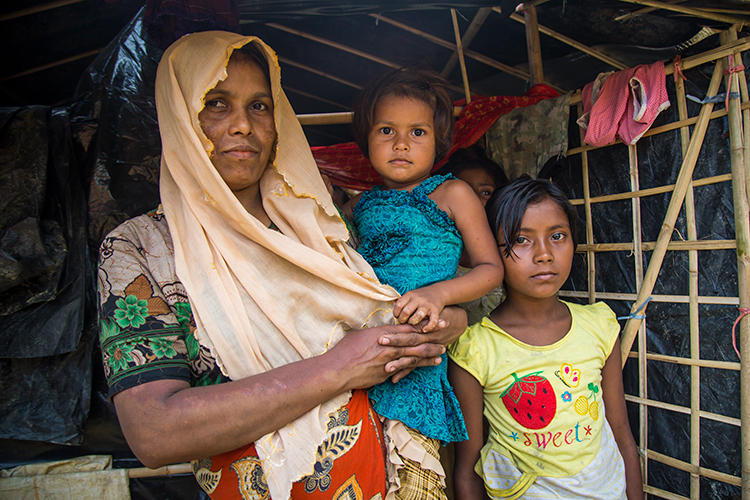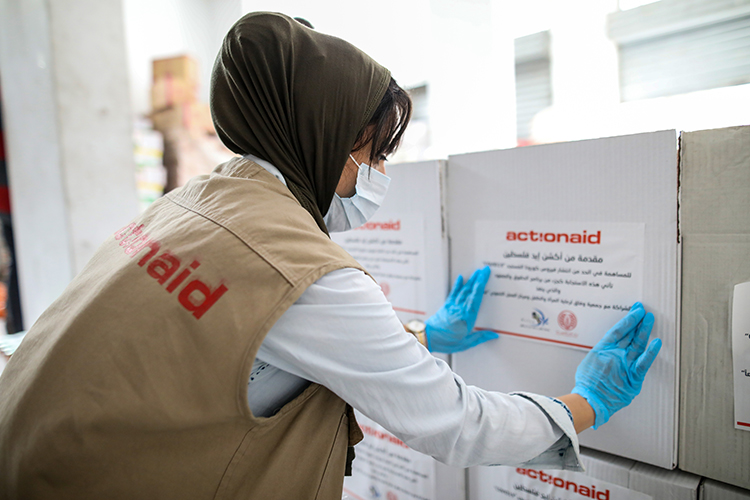As Coronavirus spreads rapidly across the world, lockdown is the ‘new normal’ for many people, and the usual rules of life have changed. Find out how this has led to a surge in a danger just as profound as the virus: domestic violence.
Lorine, a member of the Nyarongi Women’s Network which works to end violence against women in Kenya
Since the beginning of the coronavirus pandemic, women’s rights activists in China, France, Kenya, South Africa, Spain, Turkey, the UK, Ukraine and the USA have reported surges in calls to domestic violence helplines and contact services.
This is despite the fact that many women, at home with an abuser, will find it even more difficult to make the call.
Across the world, we know that one in three women experience violence in our lifetimes, most often at the hands of a male partner or close family member. In every humanitarian crisis, such as the Ebola epidemic in West Africa and the Haiti earthquake of 2010, violence against women and girls has increased.
But crucially, domestic abuse is not caused by Covid, or by any health emergency.
The root cause of violence against women and girls is gender inequality – the unequal power relations between women and men, and the systems and norms that perpetuate them.
These consistent inequalities, already deeply rooted in all societies, and already the driving force of violence, are exacerbated when women are in lockdown with abusive partners or family members.
How social distancing puts women at risk of abuse
The coronavirus pandemic is causing many women’s social networks to break down.
A woman often has friends, colleagues, and neighbours who informally monitor her safety, and who act as the first port of call in a crisis (if you’ve ever texted friends to let them know you’re home safe after a night out, you have these networks too).
So when women can’t leave home, and have to practice strict ‘social distancing’, these informal networks start to struggle.
For a woman who needs to leave a dangerous and abusive situation, stringent rules around movement may prevent her from doing so.
Feminists have documented these lessons time and again. There are toolkits, academic articles, blogs and PHDs on the links between crisis and violence against women and girls.
Women survivors, often at great personal cost, have spoken out about their experiences, and have campaigned for greater protection, improved services, and more investment from their government in women’s rights.
Why governments must prioritise women and girls in this crisis?
At ActionAid, our work to prevent and respond to violence against women and girls has never been more important.
With local women’s rights activists and partners, we are calling for governments to do more to prioritise women and girls in their Covid-19 responses.
Lakshmi Subramani, country director of ActionAid Liberia, tells us:
"Rape and other forms of sexual and gender-based violence spike during disease outbreaks. Women must be able to report cases during the pandemic and resources must be available to support survivors.
We’re calling on the government to ensure that access to justice and women’s protection are central to national response plans."
Responding to Covid-19, and to the increased violence against women and girls during lockdowns, requires a global effort and national responses that value the expertise of women’s rights organisations working to tackle violence.
These need to be centred on social justice, international solidarity and obligations under human rights law.
Why women’s leadership can make the difference?
ActionAid are supporting women-led, localised responses, by those who really understand the challenges faced by women living under lockdown, and who can reach women experiencing violence in ways that national or international actors often cannot.
In Liberia, during the Ebola crisis there was a dramatic increase in violence against women and girls, as police were unable to respond, support services reduced, and survivors were left unable to access justice.
ActionAid is using these lessons to access hard-to-reach communities through its network of partners, including women’s rights organisations and rural women’s leaders, to distribute life-saving health advice and information on what to do if experiencing violence at home. Social media and virtual meetings will be used for mobilising communities and spreading awareness messages.
In Rohingya refugee camps in Cox’s Bazaar, Bangladesh, ActionAid’s women-friendly spaces are providing critical services to women who are experiencing domestic violence.
Volunteers are going door-to-door (while maintaining social distancing) to raise awareness of the dangers of Covid-19, and ensure women know that ActionAid’s women friendly spaces are a safe place to go.
And in Lebanon, ActionAid are raising their concerns for the safety of women, and calling for greater protection.
As Aroub Alkhateeb, Head of Grants and Compliance, ActionAid Arab Region explains:
"For the many thousands of women in Lebanon who do not feel safe in their own homes already, this ‘self-imposed curfew’ is an enormous challenge.
Heightened tensions in the household due to the length of the confinement period, as well as stress and anxiety linked to the pandemic, increases the risk of domestic violence.”
“At the same time, these vulnerable women are likely to face challenges in accessing the relevant support that’s available to them, due to factors like increased demand, travel restrictions and a lack of time due to childcare responsibilities."
The additional stresses Covid-19 puts on women
As well as facing increased risks of violence, the systems that perpetuate gender inequality mean that women and girls living in poverty are disproportionately affected by Covid-19 in other important ways.
Women take on three times as much unpaid care work as men – including caring for the sick and the elderly. This leaves them particularly exposed to the virus.
School closures further increase the burden of care on mothers, by introducing teaching and extra childcare to their already busy days.
And in developing countries, more than two thirds of women work in the informal economy, without sick leave and unemployment benefits. As more and more workers are told to stay at home, family incomes and access to basic good and services are falling drastically, leaving people without food.
Through their roles at home and in the community, women are already at the forefront of responding to Covid-19, and to the spike in domestic violence.
Women’s rights organisations and activists, grounded in local communities with longstanding and trusting relationships, are best placed to identify, develop and deliver life-saving services.
Yet whatever changing situation women find themselves in currently, they have a fundamental right to live free from violence.
While posing an enormous challenge, this crisis can also provide opportunities for change, as it exposes hidden inequalities and creates an opening to ‘build back better’.
It will take a great effort to shift underlying gender inequalities, and to change attitudes and behaviours to make sure all women are safe.
But never has that great effort been needed more.
WHAT CAN YOU DO?
Please share this news on social media, help us to urgently raise awareness of this crisis which will affect millions of people in the global south and donate to support our response to the pandemics. Thank you!
Author: Lee Webster - This article originally appeared on ActionAid UK website"


